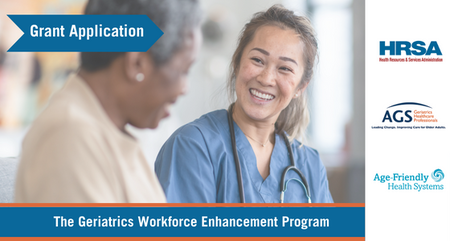
Geriatric Workforce Enhancement Program
The Geriatric Workforce Enhancement Program provides funding to educate and train the healthcare and supportive care workforces to address gaps in care and improve health outcomes for older adults by maximizing patient and family engagement and collaborating with community partners. The goal of the program is to train the primary care and geriatrics workforce and other specialties to provide age-friendly and dementia-friendly care for older adults in integrated geriatrics and primary care sites/delivery systems.
Objectives include:
- – Develop reciprocal partnerships between academia, primary care sites/delivery systems, nursing homes, and community organizations, to transform clinical training environments into integrated geriatrics and primary care sites/delivery systems
- – Provide interprofessional geriatrics clinical training and education to students, residents, fellows, faculty, and preceptors in tribal, tribal organizations, underserved and/or rural primary care sites/delivery systems with the intent to have them practice in these sites upon completion of their program
- – Establish and/or maintain education and training programs in underserved primary care sites/delivery systems that provide the supportive care workforce, direct care workers, and the primary care workforce with the knowledge and skills to improve the care of older adults, including persons living with dementia, by using innovative technology and methods
A complete list of program requirements and expectations is available in the application instructions. Priority is given to proposals that will substantially benefit rural or medically underserved populations of older adults or serve older adults in Indian tribes or tribal organizations.
Sponsors
Bureau of Health Workforce, Health Resources and Services Administration, U.S. Department of Health and Human Services
Deadlines
Feb 26, 2024 (INACTIVE)
Contact
For programmatic or technical questions:
Jennifer Solomon
301.443.0024
GWEP@hrsa.gov
For business, administrative, or fiscal questions:
Shelia Burks
301.443.6452
sburks@hrsa.gov
Eligibility
Eligible applicants are accredited health professions schools and programs. The following entities are eligible applicants:
- – Schools of Allopathic Medicine
- – Schools of Veterinary Medicine
- – Schools of Dentistry
- – Schools of Public Health
- – Schools of Osteopathic Medicine
- – Schools of Chiropractic
- – Schools of Pharmacy
- – Physician Assistant Programs
- – Schools of Optometry
- – Schools of Allied Health
- – Schools of Podiatric Medicine
- – Schools of Nursing
The following accredited graduate programs are also eligible applicants:
- – Health Administration
- – Behavioral Health and Mental Health Practice including:
- – Clinical Psychology
- – Clinical Social Work
- – Professional Counseling
- – Marriage and Family Therapy
Additional eligible applicants are:
- – Healthcare facilities
- – Programs leading to nursing assistant certification
- – Partnerships between schools of nursing and healthcare facilities
- – Partnerships between certified nurse assistant programs and healthcare facilities
Geographic coverage: Nationwide
Amount of funding
Award ceiling: $1,000,000 per year.
Number of awards: Up to 43
Project period: 5 years
Total funding available: $43,000,000
At least $230,000 of awarded funds per year must be budgeted for education and training on Alzheimer’s disease and related dementias (ADRD).
Application process
Links to the full announcement, application instructions, and online application process are available through grants.gov.
